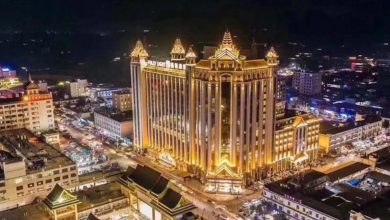
As the escalating conflict between Myanmar’s military regime and its opponents wreaks bloodshed across the country’s northeastern borderlands, neighbouring China has found itself straddling two seemingly incompatible positions: one calling for peace, the other preparing for war.
Just hours after urging an immediate ceasefire in northern Shan State on Sunday, Beijing declared that it would continue live-fire military drills on its side of the frontier in order to test its forces’ “mobility, border control abilities, and firepower capabilities.”
The drills aimed to ensure “that the People’s Liberation Army is ready for any emergency,” China’s military newspaper said in a statement that echoed a broader oscillation of Beijing’s stance towards Myanmar over the past month.
Since October 27, when the Brotherhood Alliance of three ethnic armed groups launched what has proven to be a devastatingly successful military campaign against the junta, experts and analysts have increasingly suggested that China’s previously stated support for the Myanmar regime may be swinging in the other direction—with some predicting that a complete shift in Beijing’s allegiances could be “decisive” in ending the junta’s reign.
Such suspicions are shared by pro-junta groups inside Myanmar. On November 19, regime-backed nationalists took to the streets of Yangon to condemn Beijing’s perceived support for anti-regime forces—the first time China had been named openly in public protests under the junta.
Sean Turnell, a former economic policy advisor to Myanmar’s ousted civilian leader Aung San Suu Kyi, characterised those scenes as an “extraordinary” illustration of how far diplomatic relations between the neighbouring countries have spiralled since the military overthrew Suu Kyi’s democratically elected government on February 1, 2021.
“It makes you wonder: what on earth are they doing?” said Turnell of the junta-backed anti-China protests. “Myanmar’s regime doesn’t have many friends… China’s the only one that can make a material difference. And the idea that [Myanmar] would annoy them and pull their tail is extraordinary to me.”
Despite such condemnation for its alleged support of the Brotherhood Alliance, China publicly maintains that it still abides by its longstanding policy of non-interference in Myanmar’s internal affairs. In recent days it has even projected an image of warming diplomatic ties with the junta, with three naval vessels from the People’s Liberation Army being welcomed into Yangon port on Monday to conduct security exercises, participate in friendly sports matches, and visit places of historical and cultural significance.
Yet it is still widely believed that the Brotherhood Alliance could not have launched its current offensive, capturing more than half a dozen towns and seizing control of more that 170 junta outposts, without some kind of tacit support from Beijing.
“I think all the evidence points fairly firmly in that direction,” said Turnell. “I don’t know what [China’s] end objective is, but I suspect they’re dipping their toe in the water: ‘What is the situation? How weak is the regime? How strong are the ethnic forces in the north and on the borders and all of that?’”
It’s likely that such reappraisals on Beijing’s part are largely motivated by economic interests, the fundamental pillar propping up relations between China and the Myanmar junta. As more and more territory across Shan State falls to the anti-regime forces, it is becoming increasingly clear that both sides of the conflict are now heavily concentrating their efforts on border towns and key transport corridors in a bid for control of this vital bilateral trade.
Of the three key border towns in northeastern Shan State— Chin Shwe Haw, Laukkai, and Muse—the Brotherhood Alliance has captured the first, encircled the second, and seized control of a border gate at the third. Together, they account for much of the trade between Myanmar and China, which was worth about two billion dollars in the first half of the current financial year.
This has left only Mongla, a relatively inaccessible town farther to the south and controlled by another ethnic armed group, as a gateway into China from Shan State. The result: a near-absolute severing of trade between the junta and its chief source of both weapons and money.
But disruptions to cross-border trade are probably not Beijing’s greatest concern. China also has substantial investments in infrastructure in northern Shan State, most notably a section of its oil and gas pipelines to Myanmar’s western coast.
Should the junta fail to protect such critical assets, Turnell said, the damage to the China-Myanmar relationship would be “catastrophic”—and a subsequent collapse of that alliance could be “very decisive” in bringing about the junta’s downfall.
“You would imagine that China is not going to be particularly interested in a Myanmar regime that doesn’t control those areas,” he said, speaking of the parts of the country where Beijing has key economic interests. “I think that that would be a signal that the horse they have originally backed has well and truly broken down.”
“If this regime doesn’t control those sorts of areas, it’s hard to imagine why China would support it.”
Erosion of faith
While relations between China and the junta have nosedived particularly steeply in recent weeks, it has been clear for some time that they were already trending downwards.
Turnell, who was arrested as an advisor to Suu Kyi just days after the military coup in 2021, characterised Chinese-Myanmar relations as “fairly positive” during Suu Kyi’s first term as leader of a National League for Democracy (NLD) government. While a democratic government initially made Beijing “extremely uncomfortable,” Turnell said, the NLD’s firm stance and clear vision ultimately garnered China’s respect.
The military takeover in early 2021, he added, was the beginning of the spiral—and in the 20-odd months that have followed, as the junta consistently struggles to consolidate leadership and achieve some semblance of stability within the country, the schism between the two nations has slowly widened.
“To me, the China-Myanmar relationship was probably at its healthiest just before the coup,” Turnell said. “China wouldn’t have been too worried about the fact of the coup; I think, had things been stable—and certainly stable enough to protect their investments—they probably would have been fine with it. I can’t see them having any moral objections to it, unfortunately.”
“But since then,” he added, “I think [there’s been] a gradual erosion of faith that this regime could deliver the stability that China says it wants more than anything else.”
China is not alone in questioning the value of a relationship that has long served both sides well. The junta has also begun to feel that it can no longer rely on its strongest international backer to protect its interests.
Moe Zaw Oo, deputy foreign minister for Myanmar’s civilian National Unity Government (NUG), suggested that the military’s close ties to Beijing were never more than a matter of necessity, resulting from its almost total isolation on the world stage. Amid growing suspicions that China might be placing its support behind those actively seeking its downfall, however, that relationship is now in danger of crumbling completely.
“Myanmar military rulers… were compelled to turn to China over the past decades just because they were isolated from the rest of the world,” Moe Zaw Oo told Myanmar Now. “Now, our armed ethnic allied groups at the China-Myanmar border are waging war against the junta driven by their own aspirations for freedom, not because they are proxy to any country (as alleged by the junta that China is behind them).”
“Now that the true colours of the junta have come to light, it is time for China to engage with all the parties opposed to the junta,” he added. “It should be now quite clear that the Myanmar crisis is not merely the country’s internal affairs—it has already generated a lot of implications on regional security and stability.”
“The main culprit here is none but the junta.”



